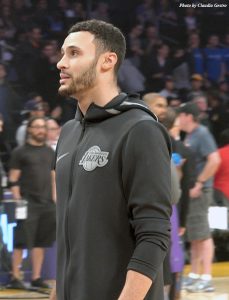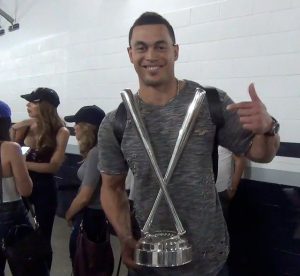Martin Luther King, Jr made the case for love over hate
If there was any doubt before Thursday — any doubt — that Donald J. Trump is a racist, it was erased when Donald J. Trump referred to countries in Africa as well as Haiti as “shitholes” and people from there were not welcome, or as welcome, as people from say, Norway.
In all fairness to Norway and the rest of the Scandinavian nations, they didn’t ask to be a part of Trump’s despicable words.
And just for the record, here are just a few reasons we don’t get more immigrants from Scandinavian countries: They have more inclusive economies, less crime, far less gun violence; better education and health care systems. The people are much happier in Scandinavia than in the United States.
You can’t say that about Haiti and many nations in Africa. That’s why we get so many immigrants from those countries, not to mention Honduras and El Salvador. The people from the last two countries, and Haiti as a matter of fact, are more like refugees. Honduras leads the world in murder and El Salvador has one of the highest rates of violent crime. Thousands of people have fled those countries, and many others, to escape the violence.
Here we are, on the day celebrating the life and legacy of the Rev. Dr. Martin Luther King, Jr, discussing whether or not our president is a racist. Well of course he is. Trump’s record, going back decades, indicates racist policies as a landlord. Calling for the death penalty for the so-called “Central Park 5,” even after they were exonerated. When he started his campaign to be president he opened it with the racist statement that Mexicans are rapists and murderers. He wanted to ban all Muslims and his “travel ban” has targeted predominantly Muslim countries. He threw Venezuela into the ban because, what the heck, they have too many All-Star baseball players taking jobs away from real Americans.
Obviously that’s not true. It’s the Puerto Rican players taking most of the jobs away from “real Americans.”
But President Trump told reporters he’s the least racist person they’ve ever interviewed. Just like I’m the most athletic person you’ve ever read. I would add a recent photo of myself but couldn’t find one.

The sad reality is there are white folks out there who feel that way, about every sport. They have stopped watching football and basketball because there is such a high percentage of African-Americans in the two leagues. Lately I’ve been watching the Los Angeles Lakers play and have marveled at the beauty of Larry Nance, Jr, Brandon Ingram, Kyle Kuzma and even Lonzo Ball. All of them are works in progress and will only get better.
Then there is Kevin Durant of the Golden State Warriors and of course LeBron James of the Cleveland Cavaliers.
We can of course point to white players that have incredibly beautiful games in the NBA. Sam Decker of the Los Angeles Clippers, another work in progress, can be extraordinary. J.J. Redick of the Philadelphia 76ers, Gordon Hayward, Dirk Nowitzki, Ricky Rubio and the Gasol brothers, Marc and Pau. Although the last two are from Spain and speak Spanish. And Nowitzki is from Germany. But what the heck, they’re still European … white European.
This got off the rails a little bit, but the point is, it isn’t about race in the NBA, it’s about skill and drive. All of the players mentioned have great skill and the drive to be the best in their profession. But some people want to make it about race because they see black faces in those uniforms. Some people think African-Americans should be grateful they live in a country that has allowed them to make millions of dollars every year for playing a game.
After their ancestors were enslaved and locked out of the political and economic system of this country for so many years — centuries actually.
Just for the record: the first player to crack open the free agency market in sports — which made it possible for players to be paid what they are worth — was a white man by the name of Jim “Catfish” Hunter, a pitching ace who had a dispute with the Oakland Athletics owner Charles O. Finley. When Finley played dumb, the arbitrator sided with the pitcher. His contract with the Oakland A’s was voided and Hunter was free to shop his talents around to the highest bidder.

(Claudia Gestro)
He had some very good offers but Hunter chose to be paid millions by the New York Yankees … [expletives deleted] Yankees … I had great admiration for former Miami Marlins outfielder Giancarlo Stanton until he signed with the [expletives deleted] New York Yankees …
So, if professional athletes in America should be grateful to anyone or thing, maybe it ought to be Catfish Hunter for taking that leap in 1974 and the MLBPA (Major League Baseball Players Association) for recognizing what that monumental decision meant for professional sports and athletes.
Mostly what professional athletes are grateful for are the people that helped them get where they are, usually family members and their communities. Most professional athletes have their causes that they give their time and money to in the off season. Many have their own foundations.
They help their communities, both where they work and where they grew up. It’s no joke when we see the commercials for the United Way and the Boys and Girls Clubs of America during sporting events. They are there in great part because so many athletes donate their time and money to those organizations. And that’s just the tip of the iceberg.
 Martin Luther King, Jr. Day was meant to be a day for people to be of service to their communities. Many people do it as a regular part of their lives all the time — like professional athletes — not just on MLK Day. But some of us need a little reminder, like this day.
Martin Luther King, Jr. Day was meant to be a day for people to be of service to their communities. Many people do it as a regular part of their lives all the time — like professional athletes — not just on MLK Day. But some of us need a little reminder, like this day.
Or, you know, we can play a round of golf and call it a day.
The Rev. Dr. Martin Luther King, Jr. once said, “I have decided to stick with love. Hate is too great a burden to bear.” I may not always have a lot of love in my heart, but I just can’t find it in my soul to hate anyone, even Donald J. Trump.

Tim Forkes started as a writer on a small alternative newspaper in Milwaukee called the Crazy Shepherd. Writing about entertainment, he had the opportunity to speak with many people in show business, from the very famous to the people struggling to find an audience. In 1992 Tim moved to San Diego, CA and pursued other interests, but remained a freelance writer. Upon arrival in Southern California he was struck by how the elected government officials and business were so intertwined, far more so than he had witnessed in Wisconsin. His interest in entertainment began to wane and the business of politics took its place. He had always been interested in politics, his mother had been a Democratic Party official in Milwaukee, WI, so he sat down to dinner with many of Wisconsin’s greatest political names of the 20th Century: William Proxmire and Clem Zablocki chief among them. As a Marine Corps veteran, Tim has a great interest in veteran affairs, primarily as they relate to the men and women serving and their families. As far as Tim is concerned, the military-industrial complex has enough support. How the men and women who serve are treated is reprehensible, while in the military and especially once they become veterans. Tim would like to help change that.
